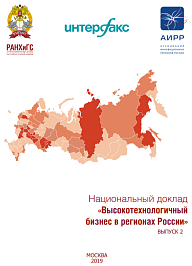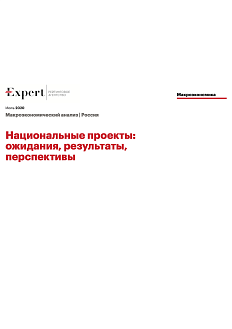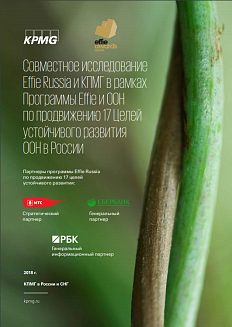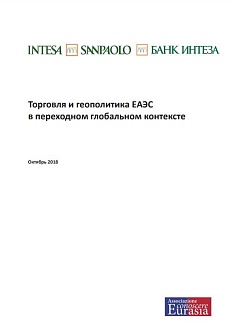The Presidential Decree of May 7, 2018 «Executive Order On National Goals and Strategic Objectives of the Russian Federation through to 2024» the main goals of long-term development are: to accelerate technological development and support high-productivity export-oriented businesses in the basic sectors of the economy, developing on the basis of modern technology and staffed with highly qualified employees.
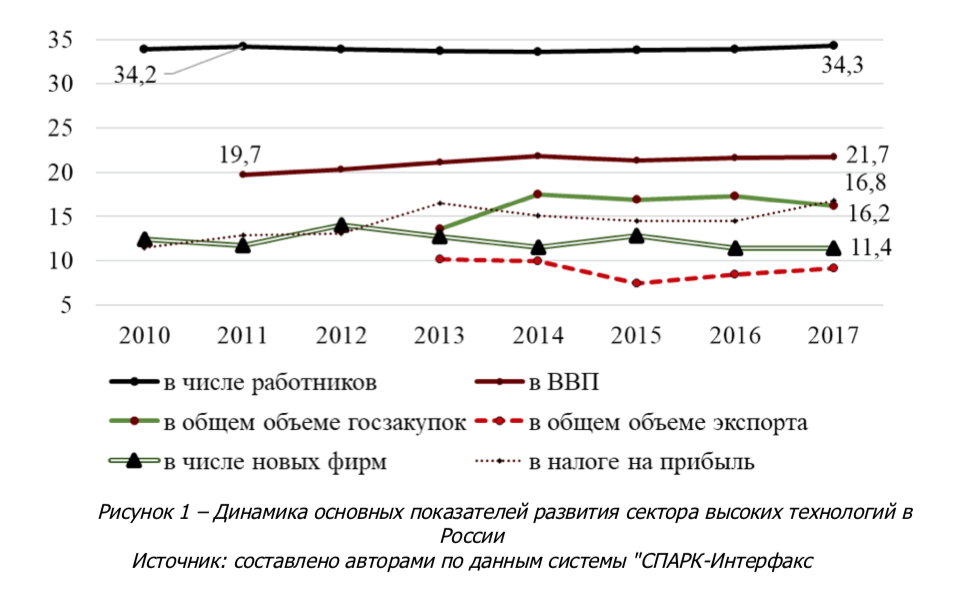
The Presidential Decree of May 7, 2018 «Executive Order On National Goals and Strategic Objectives of the Russian Federation through to 2024» the main goals of long-term development are: to accelerate technological development and support high-productivity export-oriented businesses in the basic sectors of the economy, developing on the basis of modern technology and staffed with highly qualified employees.
The stated goals will be solved within 6 of 10 national projects: «Digital Economy» (the goal is to ensure the accelerated introduction of digital technologies); «Labor productivity and employment support» (the goal is the growth of labor productivity in enterprises of basic non-primary industries); «Small and medium enterprises support individual initiative».
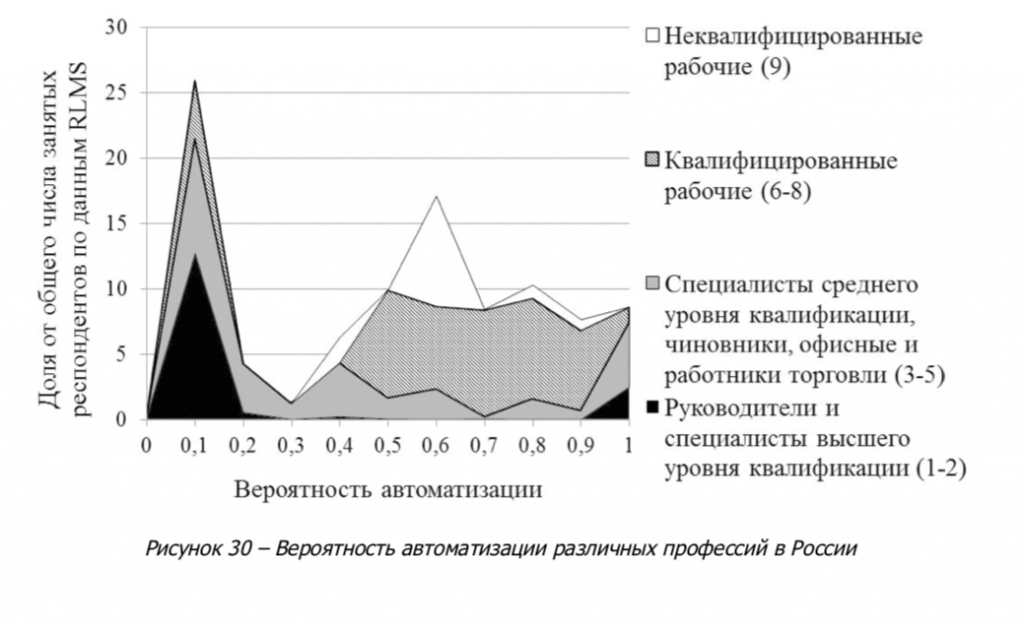
In Russia, the digitalization process is at an initial stage, gradually a change in the structure of employment towards less automated industries is taking place, the proportion of high-tech and knowledge-intensive activities is slowly increasing. The speed of the processes of substitution of humans by robots is slowed down due to economic (high cost of robots compared to that of work force), political (fear of social consequences), legal (prohibition on the introduction of certain technologies) and other restrictions. These factors could contribute to populations gradual adaptation. But the modern labour market model hinders the restructuring and modernization of production, increases inequality among the employed, deprives them of social protection and supports ambiguity. And the fight against unemployment throughout the country is achieved through informal bans on employees dismissal. This can dramatically exacerbate the social risks in the event of digital economy forced spread. High regional differentiation in the rate of technology adoption and adaptation of communities can lead to the formation of old industrial and «old service» regions with a set of social problems, a high prevalence rate of the «economy of ignorance».
In many regions of Russia, the share of the population potentially exposed to the risks of the digital economy is above 45%; in a number of southern regions, the manufacturing and mining centers have the potential to automate more than 50% of jobs! Digital transformation processes will require re-skilling of millions of employees. Co-financing the creation of an all-Russian network of fab labs and makerspaces with high-tech machining technique will enhance the technical competence of residents of both large centers and small settlements, and will also give an impetus to the development of industrial entrepreneurship.
The presence of large companies ‒ customers is also significant For the development of technological entrepreneurship. Therefore, it is necessary to give an impetus to cluster initiatives in the competitive sectors of regional economy as an effective mechanism for interaction between large businesses and small and medium-sized technological companies.
It is necessary to use and disseminate various forms of venture capital financing with state support of technology start-ups, including within the framework of public-private partnership, which will allow to form a pool of professional technology investors. Differentiated policies depending on the type of enterprise (different development tracks), including the introduction of various criteria for SMEs in the process of implementation of individual support measures.
It will require an increase in enterprises managerial independence of the military-industrial complex, forming part of various holdings and state corporations, in order to enable the implementation of regional industrial policy involving such enterprises; including implementation of industrial cooperation measures, the implementation of joint investment projects, etc. Development and implementation of lean production programs at the military-industrial complex enterprises are also required.
Adaptation programmes to the risks of the digital economy should be aimed at training and skill enhancement of the great masses of population within the framework of the continuous STEAM education systems (science, technology, engineering, art and mathematics). Popularization and entrepreneurship training programmes can play a crucial role in overcoming a potential crisis.
It will be necessary to increase the funding of education and R&D significantly, as well as promote the introduction of dual education, basic departments, related grants and innovative vouchers to intensify the links between education, science and business. It is necessary to give an impetus to the transition of leading technical universities throughout the country to the model of the entrepreneurial university (university 3.0), capable of not only training personnel, but also independently conduct applied research and create innovative companies based on them.
Despite the fact that universities do not pass under their control, support is needed for specialized educational programs and initiatives for the implementation of the so-called «Universities third mission», that is, the use of universities as points of regional development.
Corresponding programs are needed to improve the skills of engineers and medium-level production personnel, for example, expanding direct contracts with companies and participation of Secondary Specialized Educational Institutions in the «WorldSkills» championship. Improving access to human capital contributes to the growth, survival and innovation activity of firms.
The created innovation infrastructure requires additional inventory and performance evaluation throughout the country. It is required to increase investments into cyberinfrastructure, create free Internet access areas, provide 100% cellular coverage with the ability for access of all the regions settlements.
Not only infrastructure is needed, but also assistance with financing and searching for suppliers for the residents, negotiations with regional authorities and employee training for modern industrial parks in Russia. The formation of entrepreneurship ecosystems will be required, and industrial parks may become one of the regional development institutions.
The basic resource for the development of high technologies ‒ human resources ‒ requires regional authorities constant attention. Increasing the comfort of the environment in order to attract qualified personnel and the creative class should become the focal point of regional strategy. Information strategy, creation of a brand of the region can help in attracting innovators and tech entrepreneurs.
Technologically complex industries require a wide range of competencies, communications between counterparties are important. When new firms are started up, the entrepreneurial capital of the region is significant, and, consequently, the formation of appropriate entrepreneurial ecosystem.
In Russia, in conditions of low economic growth and low investment activity, the possibilities for non-resource growth are largely determined by availability of access to the foreign markets and increased state engagement into economy. Nowadays the infrastructure to support export is being actively created. Favorable institutional conditions (for example, a SEZ in Lipetsk Oblast) play a big role. However, it is the customs barriers that still limit the possibilities of high-tech business. Russias lowest positions (170th place) are in the «Doing business» rating because of the administration of customs procedures.
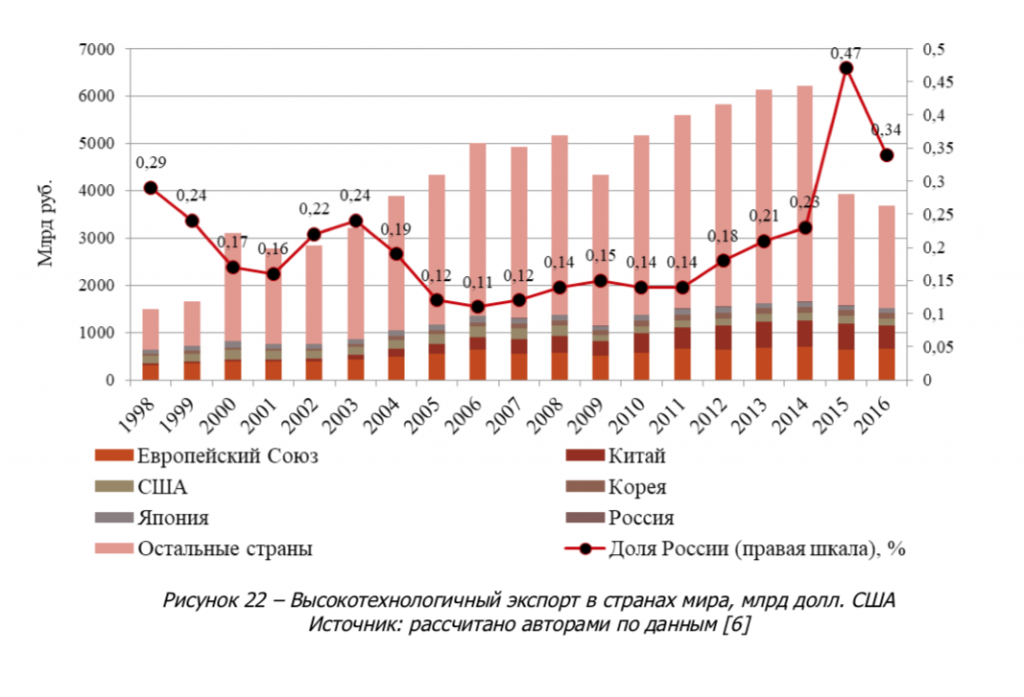
During the implementation of structural policies there will also be required both stimulation of intra-enterprise entrepreneurship (intrapreneurship) in large corporations by compensating R&D costs and staff skill development. Special attention should be paid to the cultivation of fast-growing technological start-ups, as well as to the formation of intellectual property markets and regional business ecosystems.
Thus, the targets of state incentives for high-tech and knowledge-based industries in the regions of Russia should differ significantly depending on the characteristics of the region (level of development of the business and innovation ecosystem) and the type of project supported. But it is necessary to strive to increase startup activity in the regions, increase the participation of private and professional investors in the development of high technologies, and increase the share of civilian products in the defense industry of Russia.
The Appendix gives the final grouping of regions, presents the values, ranks of the indicators used and their change for all regions of Russia, which allows you visually see the dynamics of the development of high-tech business, as well as understand the dynamics of the growth of a region in the overall rating. A number of the largest and most successful regions for the development of high-tech business can become the centers of non-resource growth of the Russian economy in the long term: Moscow, St. Petersburg, Moscow Oblast, the Republic of Tatarstan, Nizhny Novgorod Oblast, Samara Oblast and Novosibirsk Oblast. Sverdlovsk Oblast, Perm Krai, the Republic of Bashkortostan, Rostov Oblast, Chelyabinsk Oblast and a number of other subjects of the Federation.


